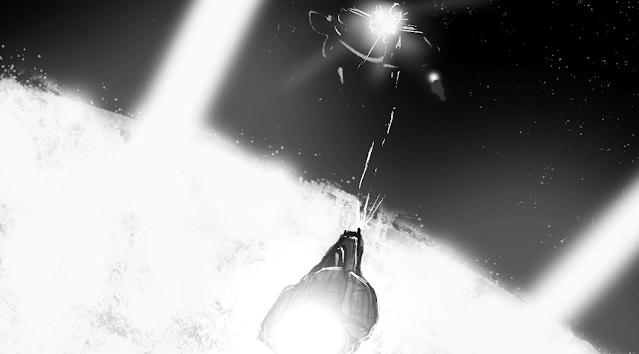Use of Weapons: An Experiment in Literary Science Fiction

For a long time, science fiction has not qualified as true 'literature', especially in the eyes of publishers. Condemned to be labelled as genre fiction, science fiction is grouped with other pulpy swords-and-sorcery novels and generally looked at as low-brow.
Banks, in his own unassuming way, challenged this notion with Use of
Weapons.
Structurally, the
novel uses numbered chapters (One, Two, Three...) to represent a linear
timeline, while chapters counting backwards in Roman Numerals (XIII, XII,
XI...) explore a reverse chronology. The complexity of these, and the way the
structure necessitates a climax in the middle of the book, demonstrate just how
talented a writer Banks was.
Use of Weapons follows Cheradenine
Zakalwe, one of Special Circumstances' foremost agents, changing the destiny of
planets to suit the Culture through intrigue, dirty tricks and military
action.
The novel uses
its dual-track narrative structure to slowly explore the diverging
character arcs of Zakalwe. The forward track follows Zakalwe as he is recruited
out of retirement by Diziet Sma to infiltrate a moderately-developed society
and extract a former political player, Tsoldrin Beychae, who has retreated from
society into solitary study. Sma sets up Zakalwe with unlimited funds to
establish an identity as a mysterious and wealthy individual called Staberinde.
The forward narrative shows us
Zakalwe’s various stratagems and setbacks in trying to achieve the Culture’s
missions, and it becomes clear that although he is very proficient in his job,
he also harbours some deep-seated doubts about the merits of the Culture’s
interference. Indeed, in Banks' novels, even the heroes are painted in various
shades of grey, committing horrific atrocities for the alleged 'greater good'
of the galactic community.
As the other narrative unfolds,
we get to see more of Zakalwe’s character arc into his past. We are first shown
repeated attempts by Zakalwe to settle down and live a peaceful life away from
his warlike past, but these invariably fail, and as we delve further back, we
see him involved in various military operations for the Culture, backing one
side or the other, but always with the same sense of skepticism and
detachment.
Midway through the
backward-moving story arc, we discover that Zakalwe was the scion to an
important aristocratic family, and grew up with two sisters, Livueta and
Darckense. He was later joined by a cousin, Elethiomel, with whom he has many
conflicts as a rival, which are exacerbated when Elethiomel has an affair with
his sister Darckense. Eventually Elethiomel betrays his adopted family to seize
power, and he and Zakalwe find themselves on opposite sides of a bloody
struggle for control. Although they are both brilliant military strategists,
Elethiomel is the more ruthless of the two, and as we get closer to the end of
the book, we discover he has made the ultimate use of weapons to defeat his
rival.
Ultimately Zakalwe becomes just
another weapon to be used by those who command him – a plasma rifle, a disruptor
cannon, a blade – merely a tool used to achieve an end.
A surprise twist actually
follows right after the big reveal and throws our entire understanding of
Zakalwe’s character upside-down. It’s a pretty impressive trick, and even after
thinking it through, the ramifications are profound for the entire story
Use of Weapons
explores trauma and nihilism through the lens of space opera, with all the
grittiness that Banksian science fiction entails. It's an unashamedly brutal
waltz through the mind of a deeply troubled individual doing deeply troubling
things for a cause he doesn't quite believe in - and if you don't think that's
relevant to the world today, you haven't been paying attention.


I need to reread this again soon, I think its probably my favourite Culture novel. I always advise newcomers to start with the Player of Games as its more conventionally structured, then move onto Consider Phlebas and Use of Weapons.
ReplyDelete